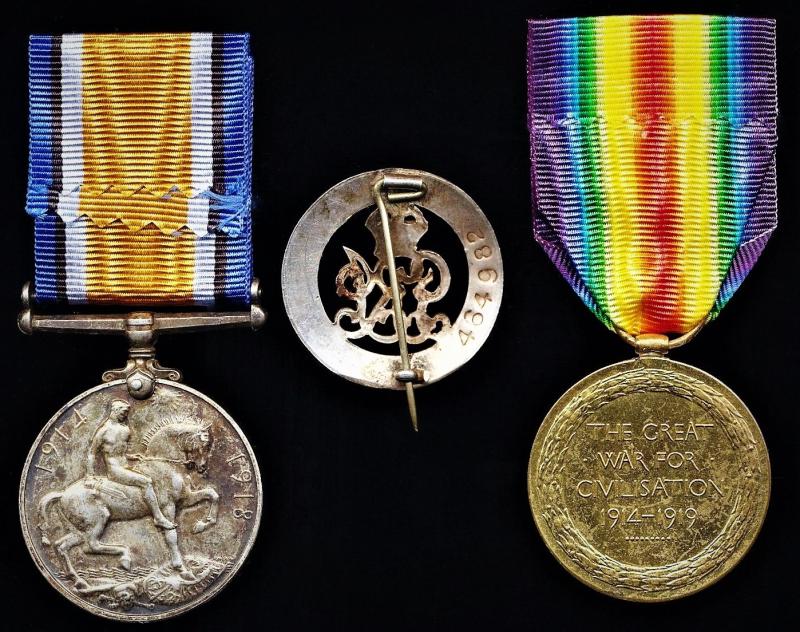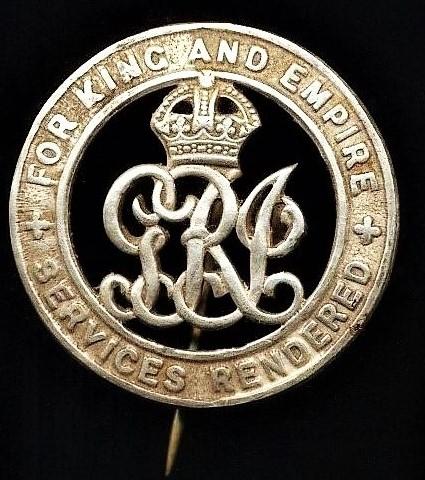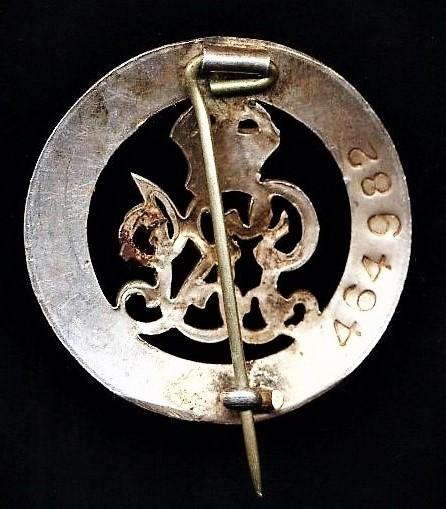A scarce Veterinary Corps Great War casualty medal pair to a 'Prisoner of War' together with companion Silver War Badge: Private Robert Kidd, 1st Battalion London Regiment late 7th (Extra Reserve) Battalion Royal Fusiliers and Army Veterinary Corps
- British War Medal. Silver issue (TT-02548 Pte. R. Kidd. A.V.C.)
- Interallied Victory Medal (TT-02548 Pte. R. Kidd. A.V.C.)
- Silver War Badge (464982). The badge complete with pin & clasp fittings
Wounded-in-Action: 228891 Private Robert Kidd, 7th Battalion Royal Fusiliers is confirmed having wounded by Gunshot & Shrapnel Wounds (GSW) to the thigh, while another POW report (International Red Cross Records) shows wounds to 'Left arm & head' at Albert, France, on, 6 April 1918
Prisoner-of-War: 228891 Private Robert Kidd, 7th Battalion Royal Fusiliers is confirmed having been captured during the German Spring Offensive, at Albert on, 6 April 1918. At capture he claimed to have been born at Burton in Lansdale, Yorkshire, England, on, 4 July 1896, and that in 1918, his home address was Hallbank, Sedbergh, Yorkshire. In captivity, he was transported for treatment to the German Military Hospital (Lazarett) 'R. Laz. III' located at Stuttgart, Germany (Prisoner of War records refer)
Regiments: TT-02548 Private Robert Kidd is confirmed as having first served in theatre of war 'France' while serving with the Army Veterinary Corps, and where he served on the Western Front, between, 3 March 1917 to 8 January 1918. Private Kidd then transferred to the 7th (Extra Reserve) Battalion Royal Fusiliers, where he was allocated the regimental number 228891, serving in France with the Royal Fusiliers from 9 January 1918 to 5 April 1918. On repatriation to the United Kingdom, he was lastly posted to the 1st (City of London) Battalion London Regiment, which was the regiment that he took his discharge from the British Army on 1 April 1919
Important: Both medals and the Silver War Badge verified as the recipient's full entitlement for the Great War per the respective campaign medal roll of the Army Veterinary Corps and Silver War Badge roll cited below:
- British War Medal. Silver issue: Ref WO 329/1905
- Interallied Victory Medal: Ref WO 329/1905
- Silver War Badge (464982): WO 329/3175 (shown enlisted 16 August 1915 / discharged from 1st London Regt 1 April 1919, due to 'Wounds')
Robert Kidd, son of Edward Kidd (a Groom & Gardener) and Grace Ann Kidd (nee Brown) was a native of, Burton, Yorkshire, England, where he was born on, 4 July 1896. By the time of the 1911 National Census for England & Wales, Robert had already left home, and was employed as a 'Beast Lad' at Rosecroft Farm, Loftus, Yorkshire-North Riding, England. Basis his family background and civilian employment working with animals as a 'Beast Boy', Robert would have been an ideal candidate for the Army Veterinary Corps, which unit he was duly posted to when he enlisted in the British Army on 16 August 1915. Robert served about 2 and a half years with the Army Veterinary Corps, including service in France between 3 March 1917 to 8 January 1918. His reason for later transferring to the 'Infantry' branch of the British Army and fateful service with the 7th Battalion Royal Fusiliers, can only be speculated. However, after being wounded-in-action and interred as s Prisoner of-War, in April 1918, he can be considered fortunate to have survived the Great War. After his repatriation from captivity as a Prisoner of War in Germany, Robert returned to Sedbergh, Yorkshire. In 1929, he married Dorothy Whitaker at, Lunesdale, Lancashire, England. At the time of the compilation of the National Register for England & Wales in 1939, Robert was described as a 'Farmer' living with his wife and two daughters (Kate and Sarah) at, Wrayton Farm, Burton Longwale, Melling, Lancashire, England. Robert Kidd is recorded to have died in Lancaster, Lancashire, England, sometime during the last quarter of 1980
A choice condition and most interesting group to a former Veterinary Corps soldier who transferred to the Infantry only to be wounded-in-action and captured by the enemy
The Great War medals in near pristine condition, retaining and fitted with their original long lengths of bright silk 'moire' ribands as issued
Condition: EF
Code: 23069







